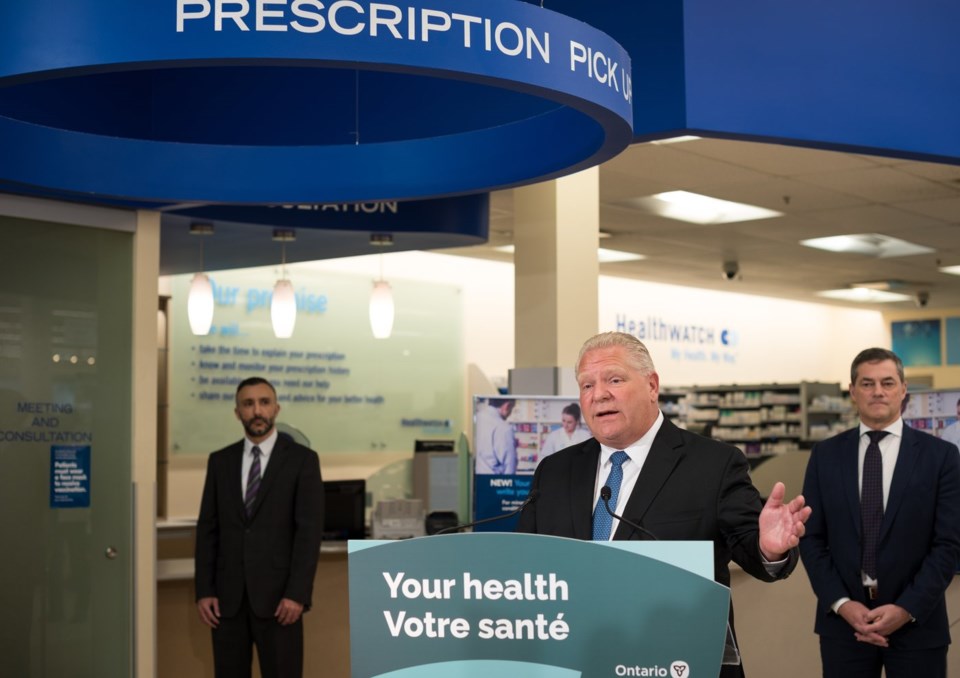TORONTO — Ontario is proposing to further expand pharmacists' scope of practice by adding to the list of minor ailments they can assess, allowing them to administer more vaccines and order some lab tests.
But while pharmacists see the proposal as an overdue solution to easing the burden on other aspects of the health-care system by leaning more on their professional expertise, doctors are raising concerns.
The government in early 2023 granted pharmacists the ability to assess and treat 13 minor ailments, including pink eye, hemorrhoids and urinary tract infections. In the fall of that year six more were added to the list, including acne, canker sores and yeast infections.
Now, the government is proposing to expand the list to include sore throat, calluses and corns, mild headaches, shingles, minor sleep disorders, fungal nail infections, swimmers' ear, head lice, nasal congestion, dandruff, ringworm, jock itch, warts and dry eye.
As well, the Ministry of Health is looking for feedback on what lab tests and point-of-care tests might be required for pharmacists to order and perform as part of assessing and treating those conditions.
The government is also considering funding pharmacists to administer tetanus, diphtheria, pertussis, pneumococcal, shingles and RSV vaccines for adults, in addition to COVID-19 and flu vaccines. The province is proposing to allow pharmacy technicians to administer the same vaccines as pharmacists.
"Our government is focused on improving access to care in communities across the province and we have seen the success of our minor ailment program, connecting over 1 million people to treatment for minor ailments," Hannah Jensen, a spokesperson for Health Minister Sylvia Jones, wrote in a statement.
Justin Bates, CEO of the Ontario Pharmacists Association, said the minor ailments program has been going well so far, and further expanding pharmacists' scope can help avoid visits to family doctors and emergency rooms.
"We want to build health-care capacity through looking at pharmacies as a health-care hub and the pharmacists' trusted relationship with their patients and to leverage that, because they are underutilized when it comes to what scope they can do," he said.
But doctors are pushing back on the scope expansions.
"The bottom line here is that pharmacists are not doctors," said Dr. Dominik Nowak, president of the Ontario Medical Association. "Doctors are trained for years and thousands of hours to diagnose and treat conditions."
Nowak said that sometimes the symptoms that would seem to suggest one of those minor ailments are really a sign of a more serious condition, and it takes a doctor to recognize that.
"When I look at a lot of the minor ailments list, I think to myself, there's nothing minor about many of these," Nowak said.
"Many of these ailments rely on the patient ... one, knowing the diagnosis themselves, so the patient's own opinion. And last I heard, most of my patients haven't been to medical school. And then two: it also relies on the patient's own opinion about whether this is something minor or something serious."
Bates said he has been "disappointed" at some of the messaging from doctors, and added that any notion that there is an increased risk to patient safety is "misinformation."
"I want to support OMA and primary care, and I do – in hiring more doctors, solving some of their issues – but it shouldn't come at the expense of other health professions gaining their ... appropriate scope of practice," he said.
"So it's not a zero sum game here. We want to have physicians be comfortable with this, but ... the way that some of these doctors are responding, it's almost like hysteria."
The government's proposal on its regulatory registry is open for comment until Oct. 20.
This report by The 91Ô´´ Press was first published Sept. 16, 2024.
Allison Jones, The 91Ô´´ Press


